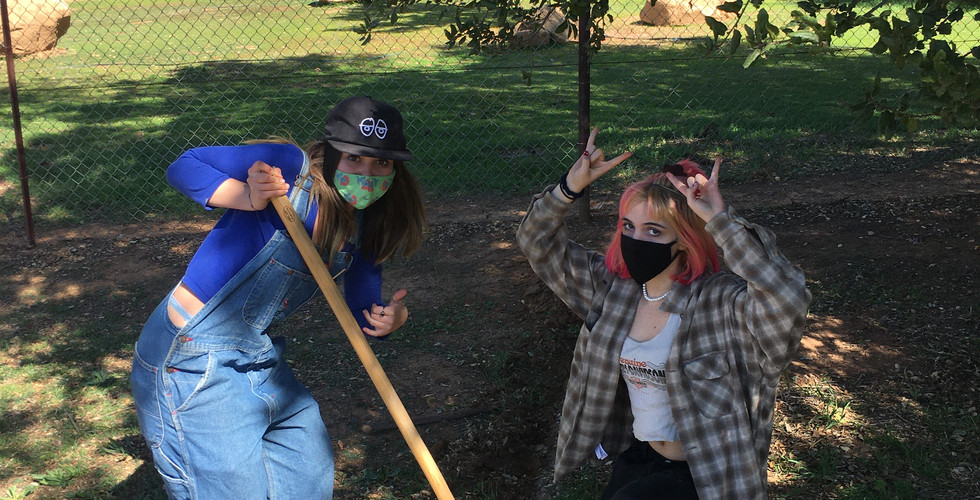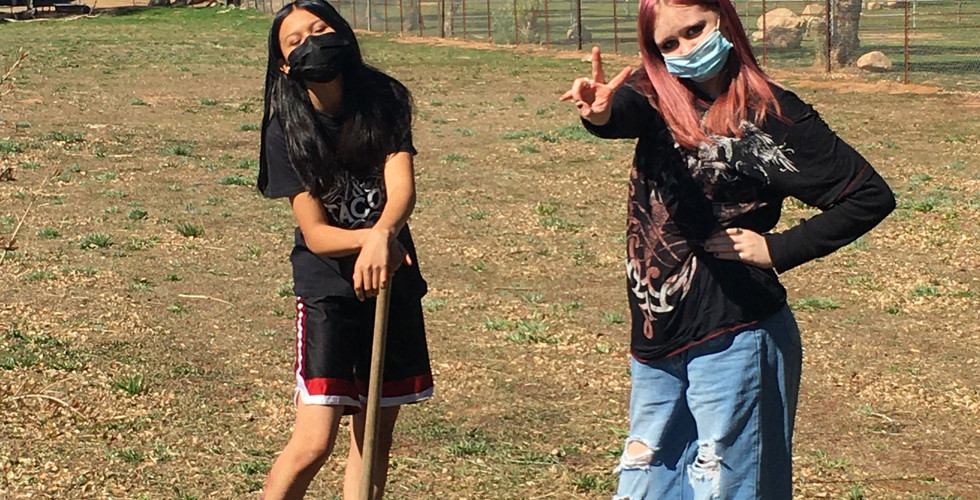February 2021
- Jim Bailey, Founder & Director

- Mar 1, 2021
- 5 min read
Dear Families,
The sun is shining, the grass is green, and it seems that spring is in the air. February at Rock Tree Sky was far less tumultuous than January. The weather has been fair, we are once again fully staffed, many families who had taken a break have returned, and several new learners have joined us. All in all it feels as though we are collectively transitioning out of hibernation and into a fresh new season.
In this letter you will find further reflections and photographs from the month of February and a parent education piece about Egocentrism During Early Childhood.
As always, Be Well and Stay Curious!
With love from the
RTS Mentors
Looking towards March
Monday March 29-Friday April 9: Rock Tree Sky is Closed for Spring Break
Reflecting on February:
As mentioned above, February was a month marked by coming together and growth.
One of the many highlights from this month includes Miss Kim returning to campus for in person mentorship and art offerings. With the support of Kim, learners could be found painting at easels set up throughout campus.
Learners also contributed to a rock painting project lead by Farmer Kelly and the Mother's Group. Learners painted rocks that will be placed throughout the front garden as plant protectors for the newly planted natives that parent volunteers spent time putting into the ground for us.
Farmer Kelly also worked with Chrissy and the learners from the Yellow Band to plant two baby oak trees in the lower field. As the trees were being tucked into the earth kids stated wishes for healthy growth, shade, and fun branches for climbing.
The following week a group of teens dug holes for the planting of natives and fruit trees in the field.
Teens also got to harvest the first flush of oyster mushrooms with the support of mycology specialist, Omar. Some teens even got to enjoy cooking and eating the mushrooms for lunch.
Throughout the month many learners also enjoyed harvesting lemons and oranges from our orchard to make and sample lemonade and orange juice.
In particular, several learners made lemonade and orange juice to sell during pick-up time on Thursday afternoons for the re-opening of the RTS Co-Op; a learner lead cooperative.
During the first half of February our youngest learners got to enjoy decorating big Valentine's envelops for themselves. And then, kids spent time making Valentine's cards for friends. Kids also made heart shaped crayons by melting down old crayons to make a whole range of fun new colors in happy heart shapes.
Another highlight from February is that local artist Dennis Shives brought spent one morning sharing his bubble magic with kids in the Yellow and Green bands. Kids got to practice blowing bubbles, enjoy chasing bubbles, and were totally mesmerized by a wind powered bubble machine.
I'm sure that there is more that I'm missing but for now I will end with that and say that I am looking forward to seeing what March has in store for us.
Parent Education Egocentrism During Early Childhood
One question that I hear frequently from parents and that I puzzle on myself is the question of how to support young children who exhibit difficulty being flexible - whether the challenge is surrounding sharing a toy, having different ideas about how to play a game, or transitioning from one activity to another, the tendency that I witness in many children under the age of eight is limited flexibility and apparent lack of concern for other people feelings.
If this sounds familiar do not panic; your kid is not a jerk or a meany pants.
They may be egocentric, but that is completely normal and developmentally appropriate for kids between the ages of 2 and 7ish (notice the ish).
Does anyone remember Jean Piaget? The renowned Swiss physiologist known for his work studying child development. If you've taken Psych 101 chances are you probably heard of him.
Piaget described the years between 2 and 7 as a child's Preoperational Stage. Without going into too much detail, one of the key attributes of children at this stage of development is the tendency to be egocentric, to see the world from only their own perspective.
But it doesn't take a child psychologist to see that this is true. A difficulty that parents and mentors often witness with their children is difficulty sharing or toys or being flexible in play. By that I mean we notice that some kids only want to play their way, with no effort to compromise. These traits are seen most commonly in children under the age of 8. And I am writing today to tell you that if your kid fits this description please don't worry, there is nothing wrong with your child.
That said, it is also not appropriate to ignore the child's behavior in the hopes that someday they will grow out of it. Rather, it is the role of the childcare provider to support kids in developing the skills to be empathetic, patient, communicative, and flexible.
For example, if one child snatches a toy from another's hand causing that other child to cry, we (the grown up) can say, "I see so-and-so is crying. They must be feeling sad. I'm wondering how we can care for our friend."
Or if your child is wanting to play don't-touch-the-ground tag and their friend is not wanting to play with them we can say, "It sounds like your friend has a different idea about how to play right now. Maybe you can play their game with them now and try don't-touch-the-ground tag later."
We can also support kids in transitioning through daily activities by making a plan together or informing the child of what the plan is. We can be supportive by providing frequent reminders of what is happening next. And, it doesn't hurt to be honest and let kids know that plans sometimes have to change. I personally find myself doing a lot of that at RTS this year.
Of course if a child is experiencing big emotions around any of these challenges it is very helpful for a grownup or a friend to be present with them to hear them, see them, and demonstrate that you understand their feelings. By being present with the child's experience we can support the regulation of the nervous system. The goal being to shift from a deregulated state of emotions to one of balance. Modeling taking deep breaths or slowly counting can be useful and practical ways to bring balance. Furthermore, recognizing that some children need alone time to process their emotions and offering that space as a caring witness is essential in many cases. "I see that you need space to be alone right now, but I'll be right over there. Come find me when you're ready to talk about it."
Several parents have expressed what an exceptionally challenging year it has been for their kids in that many children have been quite limited in time spent with playmates. Parents are noticing that their kids are exhibiting more difficulty sharing toys and ideas than was expected. This may be true.
What else is true is that the more time children spend navigating sharing space, a toy, a game, etc. with peers, the more resilient and competent they will become with these skills. It does take practice.
In summery, sharing is a skill. It is developmentally appropriate for young kids to have difficulty with this skill, especially in a time of limited socialization. You can support your child by modeling empathy, patience, communicating emotions, and reminding kids of the importance of flexibility.
I am with you all and here to talk if you need further support. For now I hope this helps. We're in it together.































































